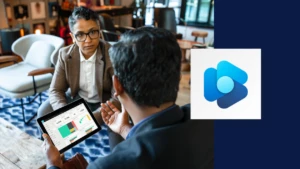
Microsoft positioned to lead in AI-led customer engagement according to Forbes.com
I came across this Forbes article, “CRM Isn’t Enough—Here’s What’s Next”, which states that “…CRM’s ability to deliver on its promise has stalled because it is not architected to address the challenges of today’s complex buying environment.” I think this is insightful and raises questions about modern topics on sales strategy that we’re actively researching and pursuing at Microsoft.
CRM, for many organizations, has long been about a focus on sales management and less on seller empowerment. And this article reinforces the need to evolve from the linear processes of today. I believe that to truly serve the modern buyer, we must reverse the current CRM model. In fact research, the research we completed suggests that sales needs to adopt a new hybrid-sales model to put customer engagement at the center of a new modern selling engine.
Engagement Increases Sales Quota Success
What we’ve found in our own research is that companies need to adjust their sales strategy to focus their process on a customer-centric model. One that blends digital journeys and highly orchestrated one-to-one engagement with our sellers at scale. When sellers accurately (and dynamically) map their touches and sales process to their buyer’s journey—with the right touch at the right time—they achieve a state of engagement. Our research also shows that sales teams that emphasize engagement are 2.3 times more likely to achieve quota sales.
Orchestration is Key
It’s not just about making a more dynamic sales process or adapting it to each buyer’s unique journey. We also need to engage other functions within an organization. A new sales model will emphasize orchestration. In other words—orchestrating data, technology, people and automation to gain deeper buyer insights to coordinate the process of engagement.
We believe that new approach is needed. By utilizing a holistic customer view, we can create personalized experiences, driven by customer needs at any point in their buying journey. We can then use big data analytics and machine learning to anticipate and dynamically deliver on those customer needs. Employing process automation allows us to streamline the engagement process and deliver intelligent, easy-to-use solutions that leverage multiple channels to naturally engage customers when and where it is convenient for them.
How Microsoft is Positioned to Meet These New Demands
In this new approach, it isn’t just sales and marketing that must think holistically about customers, but the entire organization. We must think about entire accounts, and not only individual buyers. Companies must use deep and broad data from multiple sources, combined with machine learning and intelligence, to gain unique insights. The kind of insights that were once owned by individual sellers at a 1:1 level, but now are available at an account level, at scale.
Companies, like Microsoft, are uniquely positioned to offer the infrastructure, platform, business and productivity applications. Microsoft brings together disparate transactional and relationship data across your CRM and ERP, social networks, like LinkedIn, and your productivity, collaboration and email system with Office 365 to deliver customer-centered insights. Sellers can now deliver at scale, the authentic and personal engagement that today’s buyers demand.




